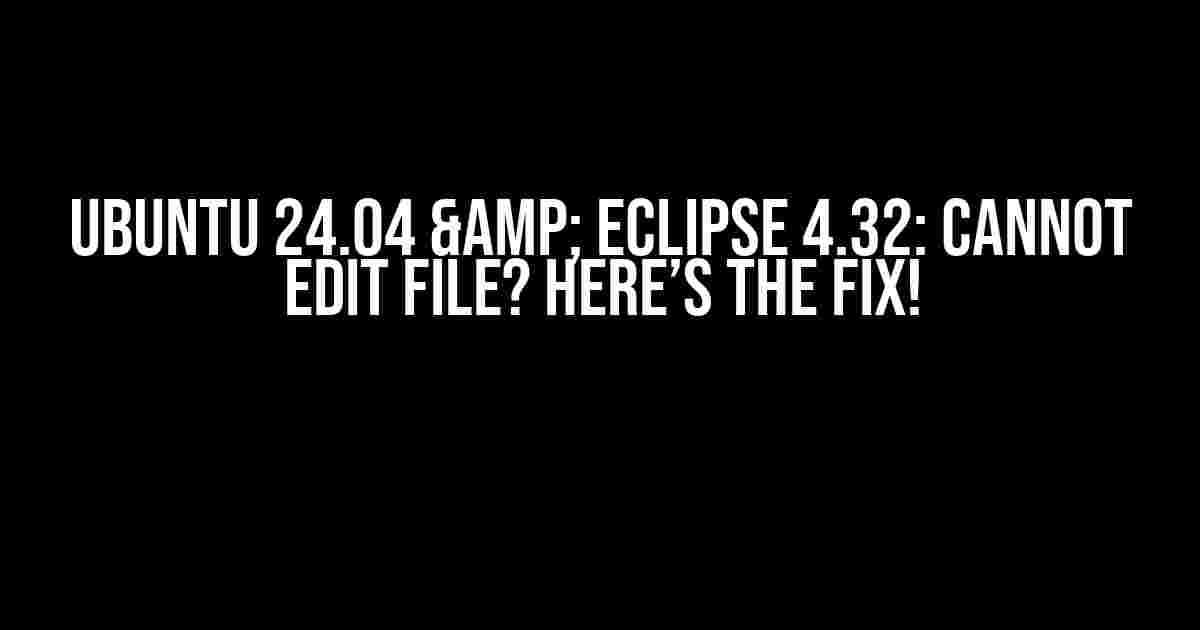Are you stuck with the frustrating issue of not being able to edit files in Eclipse 4.32 on Ubuntu 24.04? Don’t worry, you’re not alone! Many developers have faced this problem, but thankfully, it’s an easy fix. In this article, we’ll dive into the possible causes and step-by-step solutions to get you editing files in no time.
Causes of the Issue
- Permission Issues: Sometimes, Eclipse doesn’t have the necessary permissions to write to the file system, leading to the “cannot edit file” error.
- File System Corruption: Corruption in the file system can cause Eclipse to malfunction, resulting in the inability to edit files.
- Plugin Issues: A faulty or outdated plugin can also cause this problem.
- Configuration Issues: Incorrect configuration settings in Eclipse or the operating system can lead to this issue.
Solutions to the Issue
Solution 1: Check Permissions
sudo chown -R your_username:your_username /path/to/eclipse/workspace
your_username with your actual username, and /path/to/eclipse/workspace with the actual path to your Eclipse workspace.
Solution 2: Update Eclipse
sudo apt update
sudo apt full-upgrade
Solution 3: Disable the “Read-only” Attribute
sudo chmod -R 755 /path/to/eclipse/workspace
Solution 4: Check for Plugin Issues
Help > About Eclipse > Installation Details > Plugins
Help > About Eclipse > Installation Details > Updates
Solution 5: Configure Eclipse
Window > Preferences > General > Workspace
Solution 6: Reset Eclipse
rm -rf ~/.eclipse
Conclusion
| Causes | Solutions |
|---|---|
| Permission Issues | Check Permissions, Update Eclipse |
| File System Corruption | Disable “Read-only” Attribute, Check for Plugin Issues |
| Plugin Issues | Check for Plugin Issues, Update or Uninstall Plugins |
| Configuration Issues | Configure Eclipse, Reset Eclipse |
- Installing Eclipse on Ubuntu
- Configuring Eclipse for Java Development on Ubuntu
- Top 10 Eclipse Plugins for Java Developers on Ubuntu
Frequently Asked Question
Are you stuck with Ubuntu 24.04 and Eclipse 4.32, unable to edit files? Worry not, friend! We’ve got the solutions to your most pressing concerns.
Why can’t I edit files in Eclipse 4.32 on Ubuntu 24.04?
This issue usually occurs due to permission problems. Eclipse might not have the necessary permissions to edit files. Try running Eclipse as an administrator by right-clicking on the Eclipse icon, selecting “Properties”, and then clicking on the “Permissions” tab. Check the box that says “Allow executing file as program” and then try editing the file again.
Is there a specific file type that’s causing the issue?
Yes, it’s possible that the issue is specific to a certain file type. For example, if you’re trying to edit a Java file, make sure that the Java Development Tooling (JDT) is installed and configured correctly in your Eclipse environment. You can check this by going to “Window” > “Preferences” > “Java” > “Installed JREs”. If the issue persists, try reinstalling the JDT or seeking help from the Eclipse community.
Could this be a problem with my Ubuntu environment?
Absolutely! Ubuntu 24.04 has some specific requirements that might affect Eclipse’s performance. Ensure that you’re running the latest version of Ubuntu and that all necessary updates are installed. You can check for updates by running the command “sudo apt-get update && sudo apt-get upgrade” in your terminal. Additionally, make sure that you have the necessary dependencies installed, such as OpenJDK or Oracle JDK, depending on your Eclipse version.
Is there a way to reset Eclipse’s permissions?
Yes, you can try resetting Eclipse’s permissions by deleting the `.metadata` folder in your workspace. This will reset all Eclipse settings, including permissions. Be cautious, though, as this will also delete all your project-specific settings. Before doing this, make sure to back up any important projects or files. After deleting the folder, restart Eclipse and try editing your file again.
What if none of the above solutions work?
Don’t panic! If none of the above solutions work, it’s likely that the issue is more specific to your environment or Eclipse configuration. Try seeking help from the Eclipse community forums or Stack Overflow, where you can post detailed information about your issue and get help from experts. You can also try reinstalling Eclipse or seeking assistance from a local Linux or Eclipse expert.

